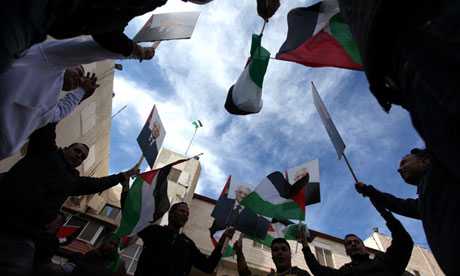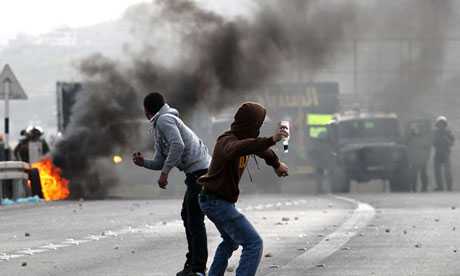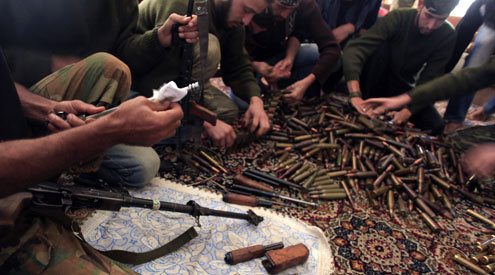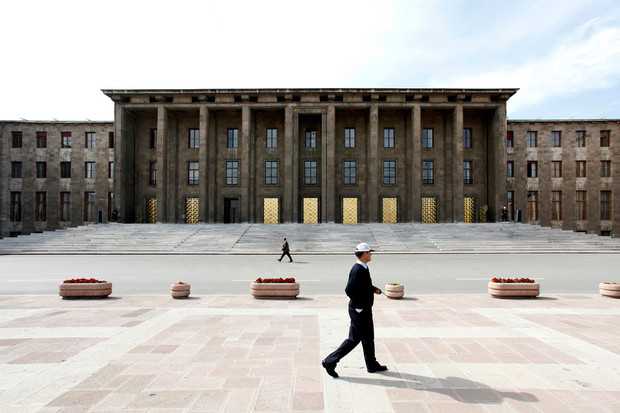Mahmoud Abbas pledge not to pursue Israel for war crimes and resumption of peace talks are UK conditions
Ian Black, Middle East editor

Britain is prepared to back a key vote recognising Palestinian statehood at the United Nations if Mahmoud Abbas pledges not to pursue Israel for war crimes and to resume peace talks.
Abbas, president of the Palestinian Authority, has called for Britain’s backing in part because of its historic responsibility for Palestine. The government has previously refused, citing strong US and Israeli objections and fears of long-term damage to prospects for negotiations.
On Monday night, the government signalled it would change tack and vote yes if the Palestinians modified their application, which is to be debated by the UN general assembly in New York later this week. As a “non-member state”, Palestine would have the same status as the Vatican.
Whitehall officials said the Palestinians were now being asked to refrain from applying for membership of the international criminal court or the international court of justice, which could both be used to pursue war crimes charges or other legal claims against Israel.
Abbas is also being asked to commit to an immediate resumption of peace talks “without preconditions” with Israel. The third condition is that the general assembly’s resolution does not require the UN security council to follow suit.
The US and Israel have both hinted at possible retaliation if the vote goes ahead. Congress could block payments to the Palestinian Authority and Israel might freeze tax revenues it transfers under the 1993 Oslo agreement or, worse, withdraw from the agreement altogether. It could also annex West Bank settlements. Britain’s position is that it wants to reduce the risk that such threats might be implemented and bolster Palestinian moderates.
France has already signalled that it will vote yes on Thursday, and the long-awaited vote is certain to pass as 132 UN members have recognised the state of Palestine. Decisions by Germany, Spain and Britain are still pending and Palestinians would clearly prefer a united EU position as counterweight to the US.
Willian Hague, the foreign secretary, discussed the issue on Monday with Abbas and the French foreign minister, Laurent Fabius, offiicals said.
Palestinian sources said Hillary Clinton, the US secretary of state, raised the issue with Abbas at his Ramallah headquarters last week, shortly before a ceasefire was agreed in the Gaza Strip, as had Tony Blair, the Quartet envoy.
Abbas has been widely seen to have been sidelined by his rivals in the Islamist movement Hamas, as well by his failure to win any concessions from Israel. Abbas, whose remit does not extend beyond the West Bank, hopes a strong yes vote will persuade Israel to return to talks after more than two years.
Officals in Ramallah have opposed surrendering on the ICC issue so it can be used as a bargaining chip in future, but views are thought to be divided. Abbas said at the weekend: “We are going to the UN fully confident in our steps. We will have our rights because you are with us.”
Leila Shaid, Palestine’s representative to the EU, said: “After everything that has happened in the Arab spring, Britain can’t pretend it is in favour of democracy in Libya, Syria and Egypt but accept the Palestinians continuing to live under occupation. As the former colonial power, Britain has a historic responsibility to Palestine. Britain is a very important country in the Middle East, it has extensive trade relations, and David Cameron should know he risks a popular backlash from Arab public opinion if he does not support us.”
Palestinians have rejected the claim that they are acting unilaterally, calling the UN path “the ultimate expression of multilateralism”. Israel’s apparent opposition to unilateralism has not stopped it acting without agreement to build and expand settlements, they say.
guardian.co.uk,




